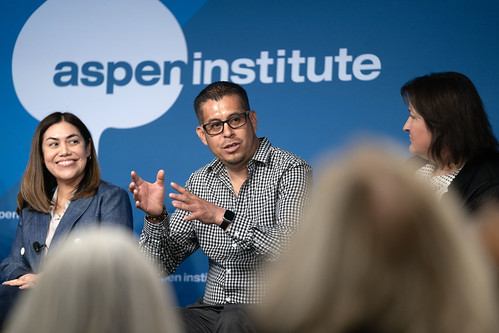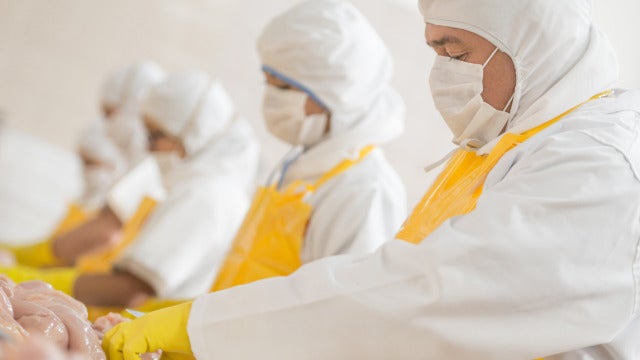Job Quality in the Fields: Improving Farm Work in the US
Description
Farm workers play an essential role in feeding our nation’s families. Despite their key role in our food system, these workers are largely underpaid, receive little time off, and have little recourse when subjected to dangerous working conditions. Half of the households in this majority-Latino workforce of more than two million earn less than $30,000 a year – and many struggle to put food on their own tables. Immigrant workers also face the risk of having their immigration status exploited, putting their safety and well-being in danger. Some become victims of forced slavery and human trafficking.
Better jobs for farm workers are possible and within reach. Multiple states have led the way in legislating better pay and protections, including the right to organize, a right these essential workers have long been excluded from. New high-road business models are showing ways workers and owners can succeed together, and new technologies are being developed to make farm work safer. But poor pay, dangerous working conditions, and inadequate labor and immigration laws persist for the vast majority of farm workers. Join the Aspen Institute’s Food & Society Program and Economic Opportunities Program for “Job Quality in the Fields: Improving Farm Work in the US,” during which a panel of experts will discuss the long-standing challenges in this essential sector and how to build good jobs for farm workers.
Photos
VIEW ALL PHOTOS
Speakers

Gerardo Reyes Chavez
Coalition of Immokalee Workers
Gerardo Reyes Chavez is a key leader of the Coalition of Immokalee Workers. Reyes is a farmworker himself and has worked in the fields since age 11, first as a peasant farmer in Zacatecas, Mexico, and then in the fields of Florida picking oranges, tomatoes, blueberries, and watermelon.
Reyes has worked closely with consumer allies to organize national actions — renowned for their creativity and effectiveness — designed to bring pressure on the large retail purchasers of Florida produce to join the Fair Food Program. He speaks publicly about the Fair Food Program at events across the country, such as the convening on farm labor challenges hosted by Harvard Law School’s Labor and Worklife Program and the Interfaith Council on Corporate Responsibility’s multi-stakeholder roundtable on ethical recruitment.
As part of the implementation of the Fair Food Program, Reyes and his colleagues conduct workers’ rights education in the fields on all farms participating in the program. He also receives complaints of abuses in the fields, manages wage theft claims, and assists in the investigation of cases of modern-day slavery when they arise.

Daniel Costa
Director of Immigration Law and Policy Research, Economic Policy Institute
Daniel Costa is the director of immigration law and policy research at the Economic Policy Institute (EPI), a think tank in Washington DC. Costa is an attorney who first joined EPI in 2010 and was EPI’s director of immigration law and policy research from 2013 to early 2018. He returned to this role in 2019 after serving as the California Attorney General’s senior advisor on immigration and labor. He is also a visiting scholar at the Global Migration Center at the University of California, Davis. Costa’s areas of research include a wide range of labor migration issues, including governance of temporary labor migration programs, migration for both professional occupations and lower-wage jobs, worksite enforcement, and immigrant workers’ rights, as well as farm labor, global multilateral processes related to migration, and refugee and asylum issues. He is the son of immigrants, fluent in Spanish and Portuguese, and holds degrees from UC Berkeley, Syracuse, and Georgetown.
 Lloys Frates, Ph.D
Lloys Frates, Ph.D
President, Frutura
Dr. L. Lloys Frates is the president of Frutura, a global produce company with a focus on environment, social, and governance (ESG), with business units in the United States, Uruguay, Peru, and Chile. Previous to Frutura, she was a managing director and investment and management committee member at Renewable Resources Group, a Los Angeles-based impact investor and asset manager focusing on sustainable agriculture and water in the US, Latin America, and Australia, where it has over 150,000 acres under management. Lloys serves on the boards of directors of Agrícola Don Ricardo — a Peru grower-packer-shipper of table grapes, avocados, citrus, and blueberries — and California Harvesters — an employee-benefit farm labor company working to create high-quality farm labor jobs.
In 2020, she was honored by the Commune of Santa Maria, Chile, for philanthropy to promote opportunities for farm laborers and their families. Lloys has experience in organized labor and served as an executive board member of UAW 2865, the union for graduate student employees at the University of California. Lloys leads the strategic planning committee and serves on the board of trustees at the Hollywood Schoolhouse, a Los Angeles pre-6 independent school located in central Hollywood. She is a member of the Southern California chapter of the International Women’s Forum and Chief Women’s Network. Lloys earned a doctorate and a master’s degree from the University of California, Los Angeles, and a bachelor’s degree from Sweet Briar College in Virginia.
 Mireya Loza
Mireya Loza
Associate Professor, Georgetown University
Mireya Loza is an associate professor in the department of history and the American studies program at Georgetown University. Her areas of research include Latinx history, labor history, and food studies. Her book, “Defiant Braceros: How Migrant Workers Fought for Racial, Sexual and Political Freedom,” examines America’s largest guest worker program. Her first book won the 2017 Theodore Saloutos Book Prize, awarded by the Immigration and Ethnic History Society, and the Smithsonian Secretary’s Research Prize. Her research has been funded by the Ford Foundation, the National Endowment for the Humanities, and the Smithsonian’s Latino Center. Prior to joining the faculty at Georgetown, she taught in the department of food studies at New York University. In addition, she curates at the National Museum of American History.
Moderator
Ximena Bustillo
Reporter, Washington Desk – NPR
Ximena Bustillo is a multi-platform reporter at NPR covering politics out of the White House and Congress on air and in print. Before joining NPR, she was an award-winning food and agriculture policy reporter and newsletter author at POLITICO, covering immigration, climate, labor, supply chain, and equity issues. Bustillo got her start in journalism at the Idaho Statesman, where she helped spearhead the state’s Spanish-language coronavirus news coverage through articles and public web forums. She is a graduate of Boise State University.
Opportunity in America
Opportunity in America, an event series hosted by the Economic Opportunities Program, considers the changing landscape of economic opportunity in the US and implications for individuals, families, and communities across the country. The series highlights the ways in which issues of race, gender, and place exacerbate our economic divides, and ideas and innovations with potential to address these challenges and broaden access to quality opportunity.
Learn More
The Economic Opportunities Program advances strategies, policies, and ideas to help low- and moderate-income people thrive in a changing economy. Follow us on social media and join our mailing list to stay up-to-date on publications, blog posts, events, and other announcements.
Food & Society at the Aspen Institute brings together public health leaders, policymakers, researchers, farmers, chefs, food makers, and entrepreneurs to find practical solutions to food system challenges and inequities. Learn more at https://www.aspeninstitute.org/programs/food-and-society-program/


